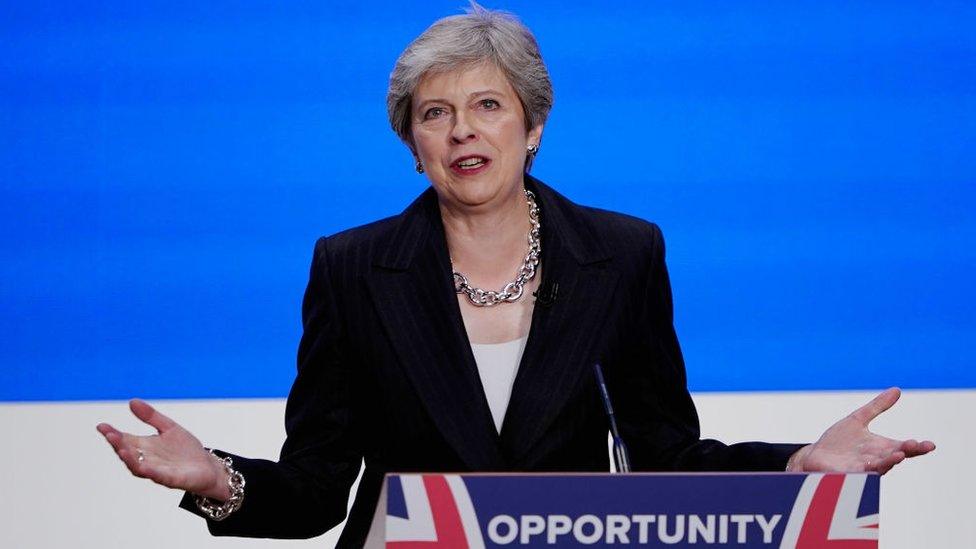PM just made Hammond’s Budget a lot trickier
- Published
- comments

So, there's the headline.
"Austerity is over," says the prime minister.
After eight years of cuts which has seen £45bn (or 10% in some years) stripped from central government spending, Theresa May has said she "gets it".
"The British people need to know that the end is in sight," she said.
The crucial review of public spending next year will not be about cuts in the future, it will be about opening the spending taps, the PM suggested.
Feeling the pain
You can imagine the rather blanched faces at the Treasury, preparing for a somewhat earlier challenge for the public finances - the Budget in just over three weeks' time.
A Budget which will be delivered against a backdrop of relatively low growth and continuing Brexit risk to the economy.
Philip Hammond is always wary of announcing the "end of austerity", given the fragility of economic growth and the fact that many cuts, such as to benefits, have yet to work through the system.
People are still feeling the pain.
He is keener to emphasise that the effort expended bringing the public finances back towards balance - where the government raises in revenues the same at it spends on services - will not be put at risk with some form of "spending splurge".
The PM just made that task harder.
Tax and spend?
Earlier in the year, Theresa May announced a multi-billion pound boost for the NHS - a move she emphasised again today.
She has said that taxes will have to rise to pay for it.
Mr Hammond has been obliged to agree.
Today Mrs May announced the freezing of fuel duty for the ninth year in a row - which cuts out one potential tax rise available to the Treasury.
She also said that the borrowing cap for local councils wanting to build new homes will be scrapped.
Which, depending on how the Office for National Statistics account for it, could well add to the national debt and eat into the government's efforts at deficit reduction.
This was the response of George Osborne's former chief of staff, Rupert Harrison.
"This is a big deal," he tweeted, external.
"Treasury will hate it so TM [Mrs May] has clearly imposed it on No 11.
"Are the ONS going to change the way this borrowing is treated?
"If not then this will add to the deficit, even if it is in theory borrowing to create an asset."
Mr Harrison is still closely connected to those with Mr Hammond's ear.
Yes, Mrs May did say that the "end of austerity" was dependent on a "good Brexit deal".
And that's a pretty Godzilla-sized if.
It is also a promise about future years, not a promise about now.
But, the words are out and such details are likely to be lost in the public's mind.
The Conservative Party even put the "end of austerity" text in bold in the speech text - just to make it extra clear.
Before this PM's speech, Mr Hammond had a difficult hand to play on Budget day.
Keeping the fiscal headroom - the public spending war chest - the Treasury believes it needs in case Brexit does turn into a calamitous, disorderly affair.
Which could damage the economy significantly.
The Chancellor also has to find money for the NHS.
And discover which taxes, if any, he can possibly increase which will be palatable to a parliament where the Conservatives do not have a majority.
After Theresa May's hour at the podium, that job just became considerably harder.
- Published2 October 2018
